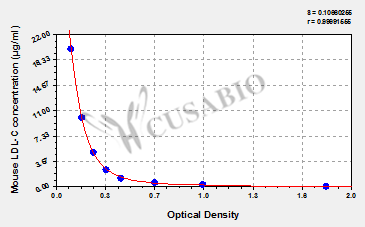The Mouse Low-Density Lipoprotein Cholesterol (LDL-C) ELISA Kit is a valuable tool for researchers working with mouse samples to quantify LDL-C levels. This kit is specifically designed for serum, plasma, and tissue homogenates from mice. It offers a wide detection range from 0.312 μg/mL to 20 μg/mL, with a high sensitivity of 0.078 μg/mL. The assay principle is quantitative, utilizing a competitive measurement approach. The assay can be completed within 1-5 hours, making it efficient for laboratory workflows. A small sample volume of 50-100 μL is required for analysis. The detection is read at a wavelength of 450 nm, ensuring accurate and reliable results. This ELISA kit has been utilized in multiple research papers, indicating its reliability and widespread acceptance within the scientific community.
Research on mouse models has been instrumental in understanding the pathophysiological mechanisms underlying atherosclerosis [1]. Studies have shown that LDL-C plays a significant role in the development of atherosclerosis, with LDL particles being taken up by macrophages through receptor-dependent and receptor-independent mechanisms, leading to the formation of foam cells, a hallmark of atherosclerotic plaques [2]. Additionally, interventions targeting cholesterol metabolism, such as blocking cholesterol absorption, have been shown to impact LDL-C levels in mice [3].
References:
[1] Y. Lee, H. Lin, Y. Chan, K. Li, O. To, B. Yanet al., "Mouse models of atherosclerosis: a historical perspective and recent advances", Lipids in Health and Disease, vol. 16, no. 1, 2017. https://doi.org/10.1186/s12944-016-0402-5
[2] H. Kruth, "Receptor-independent fluid-phase pinocytosis mechanisms for induction of foam cell formation with native low-density lipoprotein particles", Current Opinion in Lipidology, vol. 22, no. 5, p. 386-393, 2011. https://doi.org/10.1097/mol.0b013e32834adadb
[3] J. Repa, S. Turley, & G. Quan, "Delineation of molecular changes in intrahepatic cholesterol metabolism resulting from diminished cholesterol absorption", The Journal of Lipid Research, vol. 46, no. 4, p. 779-789, 2005. https://doi.org/10.1194/jlr.m400475-jlr200






